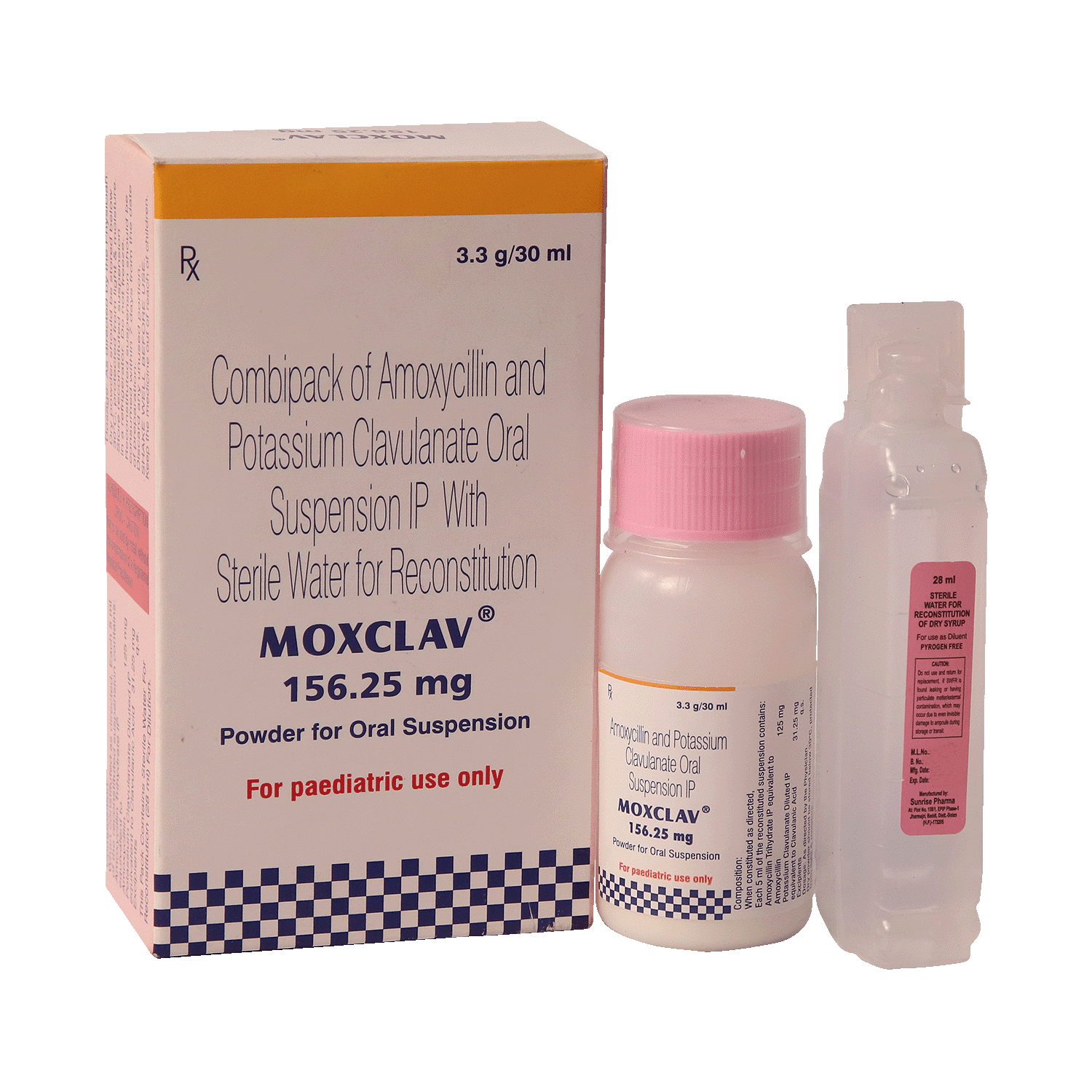
Augpen CV Syrup
Manufacturer
Zuventus Healthcare Ltd
Salt Composition
Amoxycillin (125mg) + Clavulanic Acid (31.25mg)
Key Information
Short Description
Augpen CV Syrup is an antibiotic medicine that helps treat bacterial infections of the ear, nose, throat, chest, lungs, teeth, skin, and urinary tract.
Dosage Form
Syrup
Introduction
Augpen CV Syrup is an antibiotic medicine that helps treat bacterial infections of the ear, nose, throat, chest, lungs, teeth, skin, and urinary tract. It is capable of killing bacteria that have become resistant to other therapies and thus also helps treat tuberculosis that is resistant to other treatments.
Directions for Use
Your child must complete the entire course of antibiotics. Stopping too soon may cause the bacteria to multiply again or cause another infection.
How it works
Augpen CV Syrup is an antibiotic. It has two active agents amoxycillin and clavulanic acid. Amoxycillin works by preventing the formation of the bacterial protective covering (cell wall) essential for the survival of the bacteria. Whereas clavulanic acid serves a special purpose of inhibiting an enzyme (beta-lactamase) that is produced by resistant bacteria. This makes the combination of amoxycillin and clavulanic acid an effective line of treatment for many types of infections.
Quick Tips
Your child must complete the entire course of antibiotics. Stopping too soon may cause the bacteria to multiply again or cause another infection. Encourage your child to drink plenty of water in case diarrhea develops as a side effect. Never give Augpen CV Syrup until and unless prescribed by the doctor. Do not give Augpen CV Syrup to treat common cold and flu-like symptoms caused by viruses. Check ‘expiry’ before giving Augpen CV Syrup to your child. Immediately discard all the expired medicines.
Related Medicines

Moxday CV Syrup

Multiclav 125mg/31.25mg Syrup

Moxclav 156.25mg Syrup

Ample Syrup

Novaclav 125 mg/31.25 mg Syrup

Sensiclav 125 mg/31.25 mg Syrup

Moxy Plus Syrup
Frequently asked questions
Can other medicines be given at the same time as Augpen CV Syrup?
Augpen CV Syrup may interact with other medications or substances. It's essential to inform your child’s doctor about all other medications they are taking before starting Augpen CV Syrup. Additionally, consult your child’s healthcare provider before administering any medication to your child.
Can I get my child vaccinated while on treatment with Augpen CV Syrup?
Antibiotics typically do not interfere with the components of vaccines or cause adverse reactions in children recently vaccinated. However, children undergoing antibiotic therapy should avoid vaccination until they have recovered from the illness. Once your child feels better, vaccination can be administered following their physician's advice.
Which lab tests may my child undergo while taking Augpen CV Syrup on a long-term basis?
With prolonged therapy, periodic monitoring of kidney and liver function tests may be conducted by your healthcare provider to assess your child's condition.
Can I give a higher than the recommended dose of Augpen CV Syrup to my child?
Giving a dosage exceeding the prescribed amount can increase the risk of adverse effects. If you notice your child experiencing increased severity of symptoms, consult their healthcare provider for reevaluation.
Can I stop giving Augpen CV Syrup to my child when the symptoms are relieved?
No, do not discontinue this medication unless the complete course of treatment is completed. It's crucial to finish the prescribed dosage even if you notice improvement in your child's condition. There may be ongoing effects and benefits from the medicine that require a full course.
Can the use of Augpen CV Syrup cause diarrhea?
Yes, Augpen CV Syrup can induce diarrhea as it is an antibiotic that eliminates harmful bacteria in the body. This medication may also affect beneficial bacteria within your child's stomach, leading to diarrhea. Encourage your child to drink plenty of fluids if they experience diarrhea. Seek advice from their healthcare provider if diarrhea persists and you observe any signs of dehydration, such as decreased urination with dark-colored and foul-smelling urine. Do not administer additional medication without consulting a medical professional.
Do all viral common colds result in secondary bacterial infection?
Viral infections are usually not followed by bacterial infections, although there is the possibility of bacterial infection after viral illness. It's crucial to consult your child’s doctor before prescribing antibiotics unless a specific bacterial infection is confirmed and diagnosed.
The mucus coming out of my child’s nose is yellow-green. Is it a sign of a bacterial infection?
Yellow or green nasal discharge doesn't necessarily signify the need for antibiotics. During a common cold, nasal secretions may thicken and change color from clear to yellow or green. Symptoms typically last 7-10 days.
Is there any sign which shows that my child needs immediate medical attention?
Call your child's doctor immediately in case of serious allergic reactions (breathing difficulties, skin rashes), gastrointestinal infections (diarrhea), or liver damage (weakness, paleness, vomiting). Although rare, these side effects are severe and require urgent medical attention.


